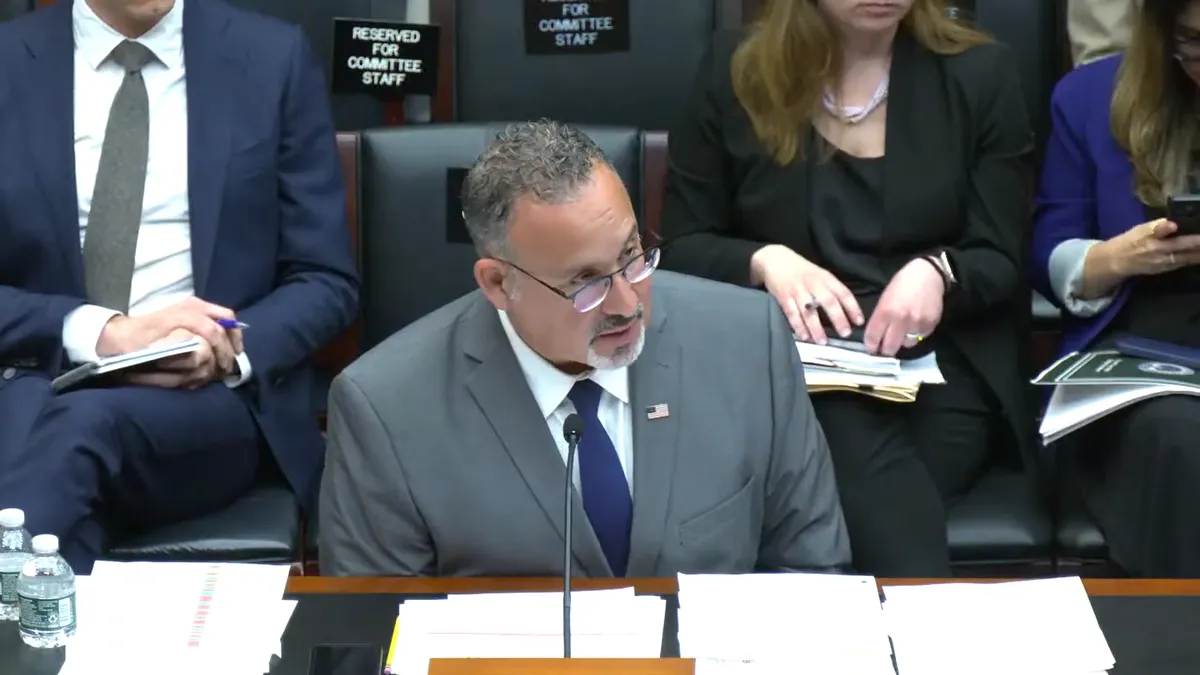Dive Brief:
- U.S. Secretary of Education Miguel Cardona made a case on Tuesday for increased funding for the Office for Civil Rights in light of a large civil rights investigations caseload and a slim number of investigators.
- In a hearing by the House Committee on Education and the Workforce on U.S. Education Department priorities, Cardona cited a worrying uptick in Title VI cases related to shared ancestry discrimination that skyrocketed after the Hamas attack on Israel and the resulting Israel-Hamas war erupted in October 2023.
- The department has over 140 Title VI investigations open, a majority of which were launched since October. While Cardona said "we are vigorously attending to the open cases now," he added that the agency is "woefully understaffed" to handle them.
Dive Insight:
The Education Department, Cardona said, has about 60 fewer OCR investigators than it did in 2009 — and triple the number of cases. OCR investigations into Title VI cases typically take six to eight months, he said during the hearing.
President Joe Biden's fiscal year 2024 budget request called for a 27% increase in funding for OCR, which Assistant Education Secretary for Civil Rights Catherine Lhamon said would allow the agency to hire 150 more staffers.
Ultimately, OCR received no increase, with funding remaining level from FY2023 at $140 million.
For fiscal year 2025, Biden is seeking a $22 million increase, or about 16% more, from the year prior's funding levels, for a total of $162 million.
This fiscal year, the increase would fund an additional 86 staffers, a majority of whom would work on investigations.
Still, Republicans at Tuesday's hearing resisted the idea of increasing OCR funding.
"I want to make sure I understand … the Department of Education's budget is $78.8 billion and you're asking … for a total of $82.5 billion, and that's just not enough money to do your job?" asked Rep. Lisa McClain, a Republican from Michigan. "That's amazing to me. There's no inefficiencies we can find? If we just give ya more money, everything will be great."
But flat funding OCR, Cardona said, "would impact it [OCR] significantly." In fact, that would drive the current caseload of approximately 42 cases per investigator — which Education Department leaders have described as untenable — to 71 cases per investigator, he said.
For the past few years, OCR has consistently reported a record high number of cases overall. Last year, the department received 19,201 complaints alleging various types of discrimination in education programs, representing a 2% increase from the previous record high in 2022.
The department expects a continued high volume of complaints through fiscal year 2025.
"We are desperately in need of additional support to make sure we can investigate the cases that we have in front of us," Cardona said.
The discussion on OCR came as part of an overall House education committee hearing on Education Department priorities. Lawmakers also grilled Cardona on the department's botched FAFSA rollout, its recent Title IX rule protecting LGBTQ+ students, and its loan forgiveness program.















